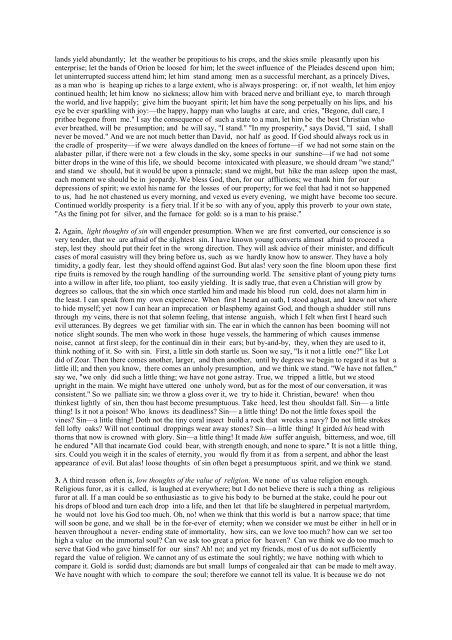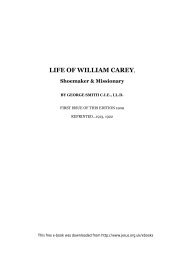Sermons of CH Spurgeon - Jesus Army
Sermons of CH Spurgeon - Jesus Army
Sermons of CH Spurgeon - Jesus Army
You also want an ePaper? Increase the reach of your titles
YUMPU automatically turns print PDFs into web optimized ePapers that Google loves.
lands yield abundantly; let the weather be propitious to his crops, and the skies smile pleasantly upon his<br />
enterprise; let the bands <strong>of</strong> Orion be loosed for him; let the sweet influence <strong>of</strong> the Pleiades descend upon him;<br />
let uninterrupted success attend him; let him stand among men as a successful merchant, as a princely Dives,<br />
as a man who is heaping up riches to a large extent, who is always prospering: or, if not wealth, let him enjoy<br />
continued health; let him know no sickness; allow him with braced nerve and brilliant eye, to march through<br />
the world, and live happily; give him the buoyant spirit; let him have the song perpetually on his lips, and his<br />
eye be ever sparkling with joy:—the happy, happy man who laughs at care, and cries, "Begone, dull care, I<br />
prithee begone from me." I say the consequence <strong>of</strong> such a state to a man, let him be the best Christian who<br />
ever breathed, will be presumption; and he will say, "I stand." "In my prosperity," says David, "I said, I shall<br />
never be moved." And we are not much better than David, nor half as good. If God should always rock us in<br />
the cradle <strong>of</strong> prosperity—if we were always dandled on the knees <strong>of</strong> fortune—if we had not some stain on the<br />
alabaster pillar, if there were not a few clouds in the sky, some specks in our sunshine—if we had not some<br />
bitter drops in the wine <strong>of</strong> this life, we should become intoxicated with pleasure, we should dream "we stand;"<br />
and stand we should, but it would be upon a pinnacle; stand we might, but hike the man asleep upon the mast,<br />
each moment we should be in jeopardy. We bless God, then, for our afflictions; we thank him for our<br />
depressions <strong>of</strong> spirit; we extol his name for the losses <strong>of</strong> our property; for we feel that had it not so happened<br />
to us, had he not chastened us every morning, and vexed us every evening, we might have become too secure.<br />
Continued worldly prosperity is a fiery trial. If it be so with any <strong>of</strong> you, apply this proverb to your own state,<br />
"As the fining pot for silver, and the furnace for gold: so is a man to his praise."<br />
2. Again, light thoughts <strong>of</strong> sin will engender presumption. When we are first converted, our conscience is so<br />
very tender, that we are afraid <strong>of</strong> the slightest sin. I have known young converts almost afraid to proceed a<br />
step, lest they should put their feet in the wrong direction. They will ask advice <strong>of</strong> their minister, and difficult<br />
cases <strong>of</strong> moral casuistry will they bring before us, such as we hardly know how to answer. They have a holy<br />
timidity, a godly fear, lest they should <strong>of</strong>fend against God. But alas! very soon the fine bloom upon these first<br />
ripe fruits is removed by the rough handling <strong>of</strong> the surrounding world. The sensitive plant <strong>of</strong> young piety turns<br />
into a willow in after life, too pliant, too easily yielding. It is sadly true, that even a Christian will grow by<br />
degrees so callous, that the sin which once startled him and made his blood run cold, does not alarm him in<br />
the least. I can speak from my own experience. When first I heard an oath, I stood aghast, and knew not where<br />
to hide myself; yet now I can hear an imprecation or blasphemy against God, and though a shudder still runs<br />
through my veins, there is not that solemn feeling, that intense anguish, which I felt when first I heard such<br />
evil utterances. By degrees we get familiar with sin. The ear in which the cannon has been booming will not<br />
notice slight sounds. The men who work in those huge vessels, the hammering <strong>of</strong> which causes immense<br />
noise, cannot at first sleep, for the continual din in their ears; but by-and-by, they, when they are used to it,<br />
think nothing <strong>of</strong> it. So with sin. First, a little sin doth startle us. Soon we say, "Is it not a little one?" like Lot<br />
did <strong>of</strong> Zoar. Then there comes another, larger, and then another, until by degrees we begin to regard it as but a<br />
little ill; and then you know, there comes an unholy presumption, and we think we stand. "We have not fallen,"<br />
say we, "we only did such a little thing; we have not gone astray. True, we tripped a little, but we stood<br />
upright in the main. We might have uttered one unholy word, but as for the most <strong>of</strong> our conversation, it was<br />
consistent." So we palliate sin; we throw a gloss over it, we try to hide it. Christian, beware! when thou<br />
thinkest lightly <strong>of</strong> sin, then thou hast become presumptuous. Take heed, lest thou shouldst fall. Sin— a little<br />
thing! Is it not a poison! Who knows its deadliness? Sin— a little thing! Do not the little foxes spoil the<br />
vines? Sin—a little thing! Doth not the tiny coral insect build a rock that wrecks a navy? Do not little strokes<br />
fell l<strong>of</strong>ty oaks? Will not continual droppings wear away stones? Sin—a little thing! It girded his head with<br />
thorns that now is crowned with glory. Sin—a little thing! It made him suffer anguish, bitterness, and woe, till<br />
he endured "All that incarnate God could bear, with strength enough, and none to spare." It is not a little thing,<br />
sirs. Could you weigh it in the scales <strong>of</strong> eternity, you would fly from it as from a serpent, and abhor the least<br />
appearance <strong>of</strong> evil. But alas! loose thoughts <strong>of</strong> sin <strong>of</strong>ten beget a presumptuous spirit, and we think we stand.<br />
3. A third reason <strong>of</strong>ten is, low thoughts <strong>of</strong> the value <strong>of</strong> religion. We none <strong>of</strong> us value religion enough.<br />
Religious furor, as it is called, is laughed at everywhere; but I do not believe there is such a thing as religious<br />
furor at all. If a man could be so enthusiastic as to give his body to be burned at the stake, could he pour out<br />
his drops <strong>of</strong> blood and turn each drop into a life, and then let that life be slaughtered in perpetual martyrdom,<br />
he would not love his God too much. Oh, no! when we think that this world is but a narrow space; that time<br />
will soon be gone, and we shall be in the for-ever <strong>of</strong> eternity; when we consider we must be either in hell or in<br />
heaven throughout a never- ending state <strong>of</strong> immortality, how sirs, can we love too much? how can we set too<br />
high a value on the immortal soul? Can we ask too great a price for heaven? Can we think we do too much to<br />
serve that God who gave himself for our sins? Ah! no; and yet my friends, most <strong>of</strong> us do not sufficiently<br />
regard the value <strong>of</strong> religion. We cannot any <strong>of</strong> us estimate the soul rightly; we have nothing with which to<br />
compare it. Gold is sordid dust; diamonds are but small lumps <strong>of</strong> congealed air that can be made to melt away.<br />
We have nought with which to compare the soul; therefore we cannot tell its value. It is because we do not
















